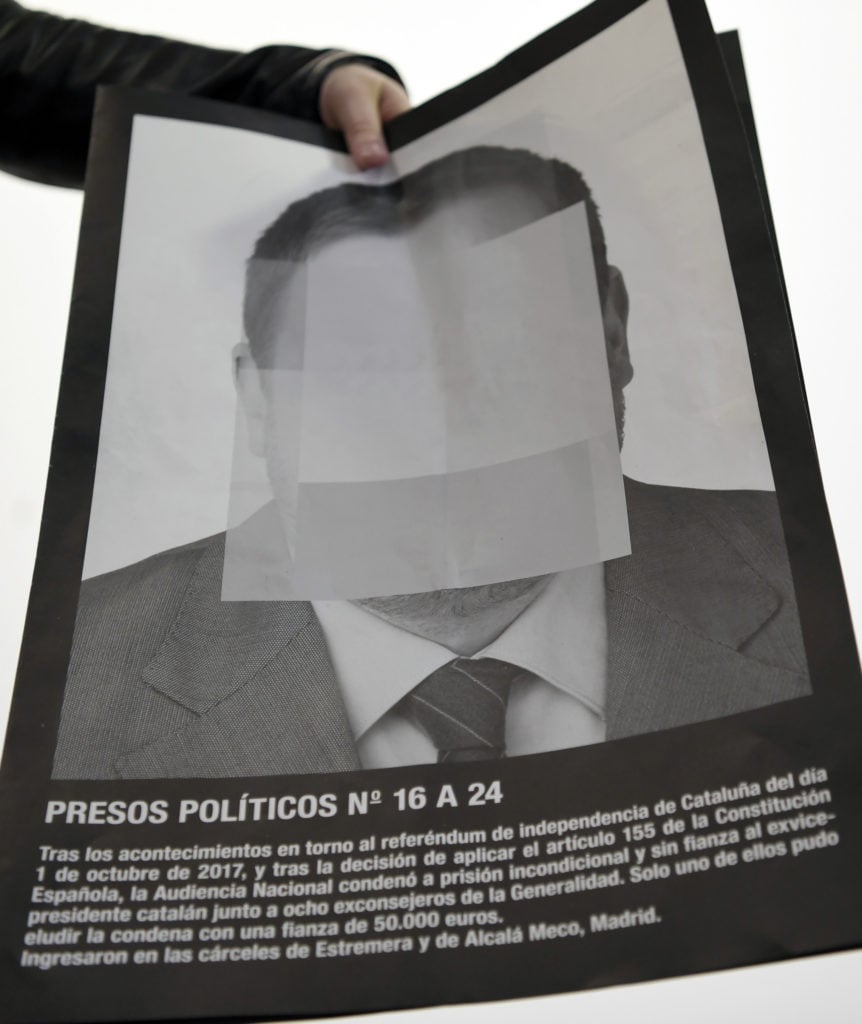Art Fairs
Santiago Sierra Denounces Censorship After His Portraits of Spain’s Political Prisoners Are Removed From ARCOmadrid
The controversial work features the partially obscured faces of jailed Catalan separatists.

The controversial work features the partially obscured faces of jailed Catalan separatists.

Laurie Rojas

Spain’s most important art fair—ARCOmadrid—opened today to major controversy. A work by the Spanish provocateur Santiago Sierra was removed from Helga de Alvear’s gallery stand hours before the VIP opening.
Titled Political Prisoners in Contemporary Spain, the work consists of 24 black-and-white photographs of politicians, activists, artists, and journalists whose faces have been obscured. Although they are not named in the work, the subjects are identifiable. They include politicians and activists supporting Catalan Independence who are under arrest and face charges of sedition and rebellion, according to Spanish sources. Their features are somewhat recognizable, and descriptions of their titles and organizations appear at the bottom of each photograph, along with their criminal charges and sentences.
Sierra’s work sparked controversy ahead of the art fair’s opening, with Spanish media reporting that Political Prisoners had been visited by the police on Monday evening.
The fair, which marks its 37th edition this year, has had its share of polemical works in the past, but this is the first time that a work has been removed. The request came from Eduardo López-Puertas, the president of IFEMA—the organization that manages the fairs and congresses in Madrid and in which the Community of Madrid, Madrid’s city council, and the Chamber of Commerce participate. López-Puertas asked the veteran Spanish dealer as a “personal request” to take down Sierra’s work to “avoid controversies,” de Alvear told artnet News.
The Madrid-born artist responded on Facebook: “Acts of this type give sense and reason to a piece like this, which precisely denounced the climate of persecution that cultural workers are suffering in recent times.” In addition, Sierra says, “it constitutes a lack of respect for a gallerist like Helga de Alvear, who participated in the launch of the fair, as well as to the maturity and intelligence of the public.”
The office of the mayor of Madrid has criticized the request. In a statement, it said that the fair’s management acted without the city authority’s knowledge, stressing that artistic freedom and expression “must be fundamental” to ARCOmadrid.
The Madrid-based dealer de Alvear insists this is not an act of censorship, however. “IFEMA and the government must not want conflict, and it’s less complicated to remove it,” she said. She is “completely used to these situations” with Sierra, whom she considers one of Spain’s best artists.
Currently, the work is being held by IFEMA, de Alvear said, but she appeared unconcerned. She had already sold Political Prisoners for €80,000 ($98,000) to an unnamed collector. Meanwhile, a 500-edition booklet featuring the work is still on show and has been selling like hotcakes for €10 each ($12).
IFEMA said in a statement that it acted responsibly as an organizer “to try to take away from the development [of] controversies that divert attention from the whole of the fair.” It insisted that it acted “with the utmost respect for freedom of expression.”